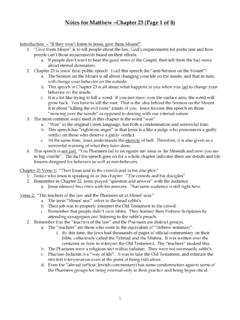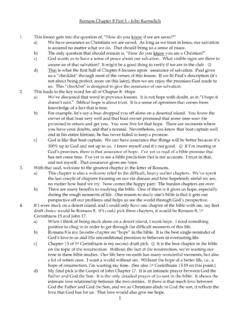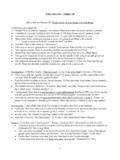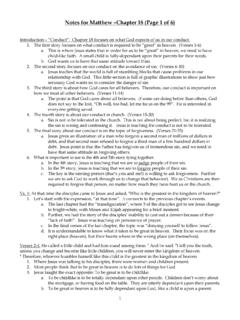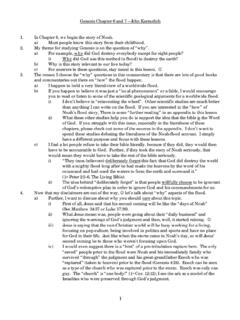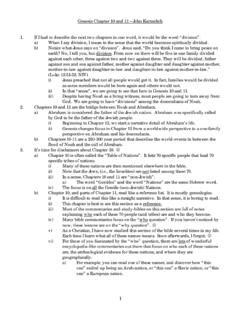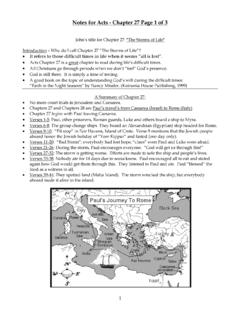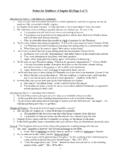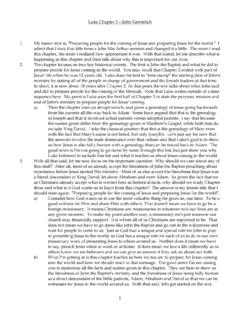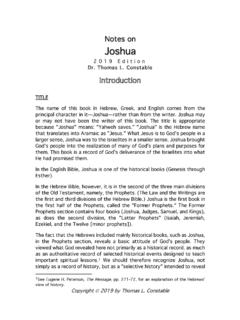Transcription of Joshua Chapters 16-19 - BibleStudyEmail.com
1 1 Joshua Chapters 16-19 John Karmelich 1. We last left the Israelites busy distributing the land they have conquered. In this lesson, we continue that distribution process. The bad news of this lesson is not much good happens. These Chapters are for the most part, a story of failure. (I'll explain more in a minute.) Therefore, this is a lesson that falls under the theme of "don't let this happen to you". Which reminds me, the title is, "The failure of the Israelites to finish conquering the land and what that means to us". a) Let me start by asking a relating question to the believing Christian: What causes us to get our focus off of God? The answer is usually that the problems and issues we face are very visible. It's easy to get our focus off of God and unto our problems because what we face is "very visible" and right in front of us. i) At the same time, to constantly trust in God means to constantly work at it.
2 It means to regularly pray and regularly seek Him for help. All it takes is to get out of that habit and "real fast" trouble comes upon us. b) On that happy note, let me explain what is going on with the Israelites and how that ties to the issue of keeping our focus on God. In this lesson, we are going to read of most of the twelve tribes of Israel receiving their promised inheritance. Like the last lesson, each tribe is going to get a carefully defined plot of land. Also like the last lesson, we are going to read a lot about "land markers" that mark boundaries. i) What caught my eye as I read this text was the lack of anything good said. In the last lesson, we had the distribution to one particular tribe, which is the tribe of Judah. Mixed in with the story of Judah's inheritance, is the wonderful story of the inheritance of a man named Caleb and how he trusted God to lead him to victory.
3 C) In this lesson, we are going to read of other tribes of Israel failing to completely conquer the land assigned to them. Part of me wondered if part of the problem was Joshua 's failure to raise up new leaders. After all, Joshua worked as an assistant to Moses for many years. The text next never mentions anyone who was Joshua 's "next in line" assistant and I wonder if that was an issue. The text is silent on that issue. So we can't say with any certainty if Joshua was training up "tribal leaders" or not. i) What is certain is that what we read in these Chapters is that one time after another "x" tribe of Israel gets their land, and then they fail to conquer their territory. ii) I do believe that much of the land of Israel was now empty from all the years of the Israelites killing their enemies. I suspect a lot of this "possession" taking was simply a manner of the Israelites, now divided by tribes, moving into the territory allotted to them.
4 Iii) At the same time, we are going to get clues in this lesson that the Israelites compromised with what God wanted them to do. iv) The mistake was the Israelites failed to completely drive out the inhabitants of the land of Israel. This mistake caused problems for many generations to come. d) So what does this mean for you and me? What does their failure to conquer this land have to do with you and me, and our lives? i) The underlying lesson here is that God wants us to work both as individuals and as groups to accomplish the things He wants to do through us. The Israelite failure to fully conquer the land is a lot like us, when we fail to fully do what God desires for our lives. Their failure could easily be our failure as well. ii) Christianity is all about trusting God in every moment of our lives. Just because we did well "yesterday" may not help us with the issues we have to face today or tomorrow.
5 2iii) What these Chapters do mean for you and me (as followers of Christ) is that He (God) wants us to live the full rich life that comes from trusting Him. It means that He wants our lives to have "purpose" and He wants to guide us in that "purpose" of making a difference for Him. In other words, just as God wanted the Israelites to "take" the land He has assigned to them, so God wants us to go "take" the life He desires for us. iv) Le me explain further: Paul teaches in the New Testament that some of us are called to be pastors, teachers, helpers, etc. (See Ephesians 4:11). God wants us to live a life to make a difference for Him. Does that mean we have to change jobs? For some the answer is yes, but for most the answer is no. The point is to seek God with the specific question of what do You want me do with my life right now. Know that the answer God gives us today may be different than the one He gives us "tomorrow".
6 The point is God wants us to make a difference for Him. v) God may be calling us into some specific ministry. That may mean for now, we have to do "x" as God is preparing us for some specific purpose down the road. God may be calling us to run a church one day, and for now, God just wants us to "sweep up" around the place. God may call us to be "big givers" one day, but for now, He just wants us to give a little to get accustomed to the idea of giving. My point is we don't know what the future holds for our life or how long of a life we have. We are just to move forward with what God calls for us today. vi) What if I have no idea what God wants for me? Let's say we have prayed and haven't got a great answer to what He wants for my life. Then it may be a simple matter of studying God's word, going about our lives and seeing what makes us "comfortable". I find that where God wants us "now" is someplace we can't stand "not being"!
7 For example, one reason I write these studies every week, is I can't stand not doing it. You may find that you do something regularly for God because you can't stand not doing it. It is something that you just love to do or feel the need to do. e) OK, on that convicting introduction, let's deal with the Israelites and land grants. 2. chapter 16, Verse 1: The allotment for Joseph began at the Jordan of Jericho, east of the waters of Jericho, and went up from there through the desert into the hill country of Bethel. 2 It went on from Bethel (that is, Luz), crossed over to the territory of the Arkites in Ataroth, 3 descended westward to the territory of the Japhletites as far as the region of Lower Beth Horon and on to Gezer, ending at the sea. 4 So Manasseh and Ephraim, the descendants of Joseph, received their inheritance. a) We are back to the topic of dividing up the land of Israel by tribe.
8 The focus is on one of the twelve tribes named after its founder, Joseph. For those who don't remember, Joseph is one of 12 sons of Jacob and the father of his tribe. That tribe was legally "split in two tribes" as each of Joseph's two sons got an equal inheritance with Joseph's other 11 brothers. Remember that the tribe of Levi didn t get an equal share with the other tribes. In order for there to be "twelve tribes" inheriting the land, the tribe of Joseph got a "double portion" to make up for the fact that the tribe of Levi did not get "one twelfth" of the land. i) So why did Joseph get a double portion? I suspect it was a reward as Joseph forgave his brothers and "led" them to Egypt roughly 400 years earlier. ii) What's so special about the number "12"? Don't know, but God likes to work that way in the tribal divisions. b) With that said, Verses 1-3 give the boundaries of the tribe of Joseph (for both sons) within the Promised Land.
9 Remember that one of Joseph's two sons was Manasseh. Half of the tribe of Manasseh settled outside of the land of Israel to the east. Therefore the next section is the breakdown of the land of Israel given to the other half of the tribe of Manasseh and all of the tribe of Ephraim. (These are the two sons of Joseph). 33. Verse 5: This was the territory of Ephraim, clan by clan: The boundary of their inheritance went from Ataroth Addar in the east to Upper Beth Horon 6 and continued to the sea. From Micmethath on the north it curved eastward to Taanath Shiloh, passing by it to Janoah on the east. 7 Then it went down from Janoah to Ataroth and Naarah, touched Jericho and came out at the Jordan. 8 From Tappuah the border went west to the Kanah Ravine and ended at the sea. This was the inheritance of the tribe of the Ephraimites, clan by clan. 9 It also included all the towns and their villages that were set aside for the Ephraimites within the inheritance of the Manassites.
10 A) These verses focus on the geography of the land gives to the tribe of Ephraim. Again, Ephraim was one of the two sons of Joseph and Ephraim is of the tribes of Israel. b) As I stated in the last lesson, my lessons are not designed to be geography lessons. I'm sure there are interesting "tidbits" about these geographical places, but to put it simply, that is not the focus of my lessons on the book of Joshua . 4. Verse 10: They did not dislodge the Canaanites living in Gezer; to this day the Canaanites live among the people of Ephraim but are required to do forced labor. a) In the final verse of this short chapter , we read that the tribe of Ephraim failed to kill all the people who lived in their allotted territory, but did require them to do force labor. b) Remember that the word "Canaanites" is a generic word that described all the people living in what we call the land of Israel prior to the Israelites actually living there.
